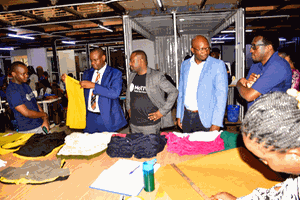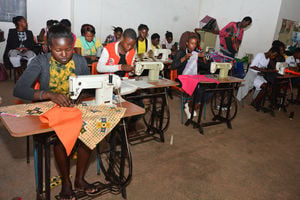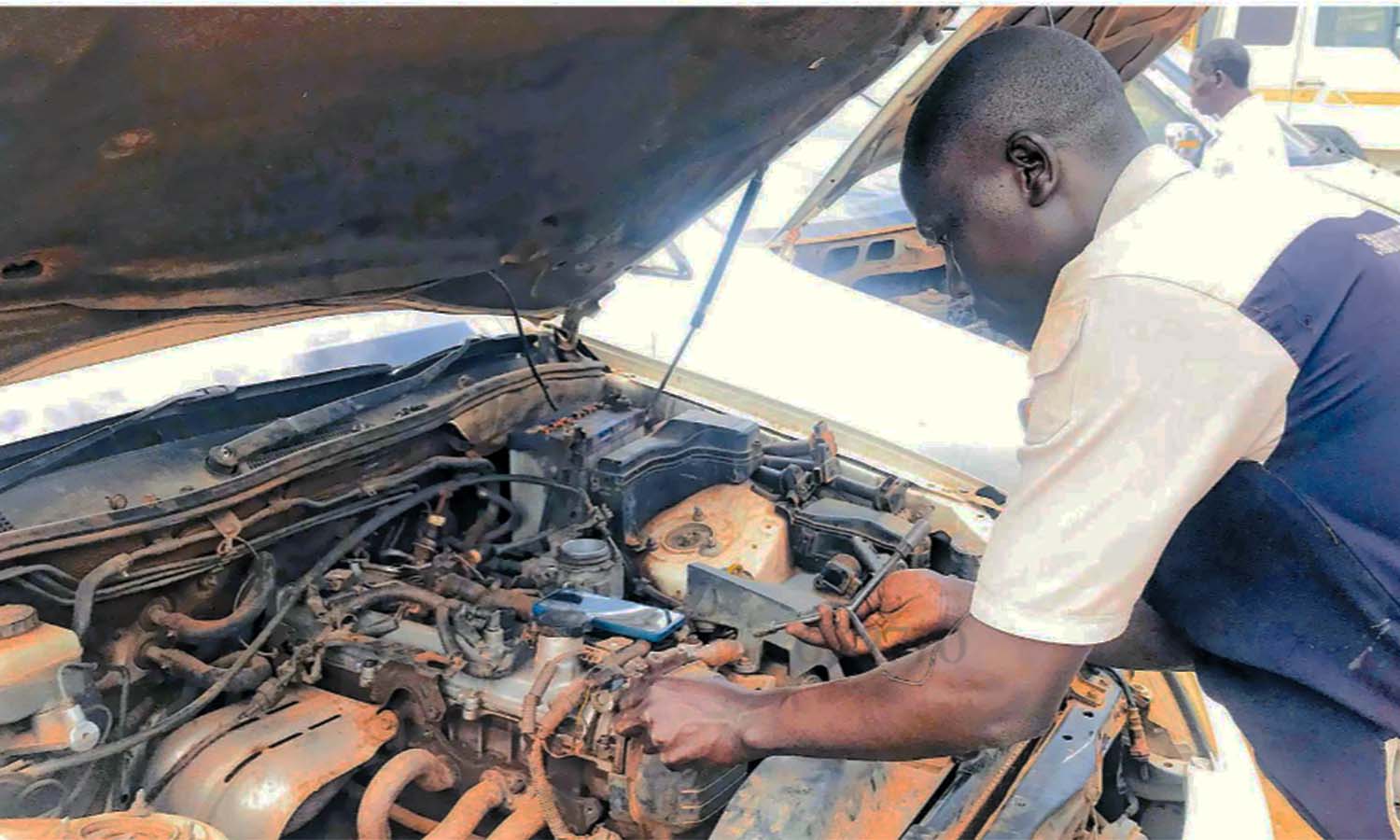
Ronald Katamba, founder of Jaguza Tech and Afriosoft IT Solutions.
Being an innovator is tough, especially in developing countries like Uganda where tech is complex. To build solutions that improve their communities, innovators need a mix of brilliance, grit, and, often, a touch of privilege.
Take Ronald Katamba, founder of Jaguza Tech and Afriosoft IT Solutions. In 2013, he launched Jaguza Tech, an agritech start-up in Uganda aimed at transforming livestock farming across Africa. His goal?
To tackle issues like livestock diseases, theft, and poor tracking systems, which hit smallholder farmers the hardest.
Mr Katamba’s creation, the Jaguza Livestock App, integrates Artificial Intelligence (AI), computer vision, and the Internet of Things (IoT) for better livestock management.
The app runs on Android, iOS, Windows, SMS, web, and USSD, making it accessible across diverse platforms and usable for farmers with limited technology access. The goal was to boost livestock health and productivity, even for farmers with limited Internet access, so they could effectively monitor their animals regardless of tech constraints.
This technology tracks vital health metrics like respiratory rate, blood pressure, digestion, and heart rate, enabling early diagnosis of health issues. It even sends alerts when animals show signs of distress or wander off, providing real-time data on temperature changes to help farmers respond immediately.
Its app goes a step further, pinpointing the location of nearby veterinary doctors for urgent assistance. With more than 18,000 users—80 percent of whom are active weekly—Jaguza’s system spans 8,000 farms across 13 countries.
It all started with Afrosoft IT Solutions, a venture Mr. Katamba launched in 2007 during his second year of university. Inspired by tech mentors from Microsoft, who advised him to start his own company instead of working for someone else, he set up Afrosoft in a computer lab, naming it after “Microsoft” as a nod to his inspiration. Afrosoft IT Solutions is a company grounded in training, innovation, and software development. It not only creates custom software for clients but also brings its own ideas to life, with Jaguza Tech as one of its proudest achievements.
Against the odds
Mr. Katamba speaks passionately about Jaguza, which he and his dedicated team built from scratch, emerging from a place of resilience. He lost his parents at age 12 and had to drop out of school, only returning by raising rabbits. When disease wiped out his rabbits, he was left without a way to support himself or return to school.
Years later, at university, he envisioned a technology to prevent others from facing similar losses, and Jaguza was born. The technology, which extends to a mobile application, now detects livestock diseases up to 48 hours before symptoms appear, tracks cattle to deter theft and unmonitored movements, and offers localised guidance on farming practices. It includes an AI-powered chatbot to help farmers with feeding, housing, and general livestock care. Available in both local and international languages, Jaguza’s reach goes beyond Uganda—it’s a global tool with roots in local struggles. It has impacted 82,000 farmers and operates in five countries, with paid pilot projects in New York and Ohio.
Now, Jaguza is exploring drone integration with a data centre to enhance livestock monitoring. For farmers with vast herds, drones can track and photograph cattle from the sky, providing real-time location updates. “Imagine,” he says, “if the Ugandan government used this drone tech to curb cattle rustling in the north—it could transform tracking. I’ve tested it in New York and Ohio, and it works.”
Stumbling block
Yet, despite his success abroad, Mr Katamba feels sidelined at home. The Agriculture ministry dismissed his ideas, saying “it will not work,” a response that left him deflated. He believes the government should encourage home-grown innovations that tackle real challenges facing Ugandans.
“I appeal to the government to give innovators like us a chance. It’s painful when other countries see our impact, but Uganda overlooks it. The President has expressed interest in my tech, but reaching him? I don’t know how—I’m no politician,” he says.
He’s not alone. Many Ugandan entrepreneurs are brimming with ideas and talent, yet feel held back by a system that doesn’t nurture innovation. Mr Katamba and his team dream of a moment with the President—just like Kiira Motors had.
When a team of Makerere University students built a small electric car in 2014, the President took notice, invited them to present their vision, and soon after, Kiira Motors received more than $100m from the government. Today, its factory in Jinja is gearing up for mass production next year, with the goal of producing 5,000 vehicles per year.
Here is the edited content presented as a cohesive story while preserving all the original text, quotes, subheadings, and structure:
Dreaming on
Uganda has countless innovators who need more than selective support—they need a thriving ecosystem. Mr Katamba’s team (seven) may be small, but they’re determined. Afrosoft is not only pushing Jaguza forward but also training young Ugandans in software development so they make up a new generation of tech talent to drive innovation and impact communities.
“Agriculture, where I’m focused, is central to Uganda’s economy, employing around 70 percent of the population in farming, forestry, and fishing,” he says. Most people in Uganda’s agricultural sector are marginalized, especially in rural areas. For youth entering the workforce, agriculture is a lifeline, with three-quarters of those aged 15 to 24 landing their first job in this sector. Agriculture also drives about 32 percent of Uganda’s gross domestic product. Yet, with low modern farming adoption, its potential is under 40 percent, figures from the World Bank Group data show.
“Our leaders need to emphasize tech solutions that tackle agricultural challenges,” Mr Katamba says, adding, “Some countries want to help me set up there, but I want it here in Uganda, where Ugandans developed this tech.”
Product Development
Arthur Mukembo is the lead at Future Lab Studio at the Innovation Village, where he is connecting founders and corporate innovation leaders to opportunities, tools, and capital to leverage technology to thrive.
“Building products,” he says, “starts with an idea.” Typically, an innovator begins with a prototype to test if a concept works. If it does, they proceed to build a minimum viable product (MVP) to validate market demand. Before going fully commercial, however, they must meet national standards, such as product and system certification from bodies like the Uganda National Bureau of Standards (UNBS). Products here undergo rigorous checks on quality, packaging, labeling, and societal impact, ensuring they meet scientific, regulatory, and community standards.
Afterwards, they protect their creations with intellectual property and trademarks with the Uganda Registration Services Bureau (URSB). Then, they go to convince the “money people” that their product can succeed commercially.
But here’s the kicker: even after slogging through certifications and patents, Uganda’s innovators hit a wall. Sure, the country has incubation centers like Uganda Industrial Research Institute and the National ICT Innovation Hub, but they’re like pop-up tents in a storm—they just can’t shelter big dreams. Authorities know this.
“Ugandans are some of the world’s best innovators and entrepreneurs,” says Japheth Kawanguzi, the team leader at Innovation Village, adding, “But innovation doesn’t blossom in a vacuum. It needs an ecosystem—policies, capital, market access, and tech-readiness.” Picture it as a five-course meal: each element adds a layer to nurturing.
No head start
Kenya’s ecosystem is miles ahead, giving their innovators a supercharged toolkit of funding, mentorship, and infrastructure. The result? Kenyan startups rake in investments and scale up at rates Ugandan founders dream of. Data from The Big Deal, a company that tracks investments of startups in Africa, shows that in 2023 Uganda’s startups secured $5m funding while those in Kenya received an impressive $880m.
Uganda’s innovators, however, remain on a mission: harnessing tech to tackle everything from FinTech to AgTech to renewable energy to solve big problems and create real value, but the capital market isn’t exactly cooperating.
“Angel investors are typically the first to back and mentor startups,” says Mr Kawanguzi, but in Uganda, he adds, startups lean on banks—institutions built more for safe loans than high-risk innovation. While grants are filling some gaps, the venture capital hill remains a steep one to climb due to the market size.
“Our entrepreneurs are struggling with what is known as the pioneer gap. This phase, between the initial concept and reaching scale, is particularly challenging. During this period, startups often find it difficult to secure funding and support because investors consider them too new or risky,” Mr Kawanguzi says, adding, “Despite being a phase of much experimentation and potential failure, it also holds significant opportunities for social impact. What we need in the market is Patient Capital to support our most promising entrepreneurs through these critical stages.”
What to do
Uganda boasts some real success stories. Rocket Health, Xente, Ensibuuko, MobiPay, and Wazi have all cracked the code by solving market challenges in novel ways and creating solid value for customers. They’re living proof that innovative ideas can flourish here, but they’re still outliers.
Mr Kawanguzi believes government leadership is key to bolstering this ecosystem. Policies that encourage participation, he says, can send a clear message that entrepreneurship is valued and supported.
“For instance, tax incentives could reward companies for creating real, sustainable value rather than just extracting it,” he offers. Other African countries have already stepped up. In 2018, Tunisia became the first to pass startup legislation, streamlining processes for entrepreneurs. Senegal followed suit in 2019, with a dedicated startup support center.
“In Uganda, we have just begun the process of developing a startup act. Such legislation can galvanize the entrepreneurship community and familiarize the government with entrepreneurial issues. This leads to increased innovation and firm growth, faster incorporation and registration of businesses, attraction of expertise and gig workers, and improved access to capital,” says Mr Kawanguzi







